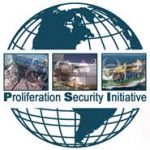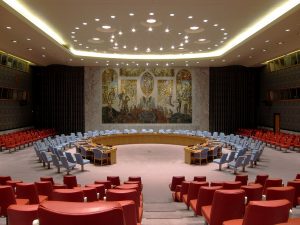
In September 2003, the original eleven Proliferation Security Initiative (PSI) partners gathered in Paris to adopt the PSI Statement of Interdiction Principles. Currently, 105 nations around the globe have endorsed those principles. The Statement of Interdiction Principles calls on all endorsing States to establish, consistent with national legal authorities and relevant international law and frameworks including United Nations (UN) Security Council Resolutions, a more coordinated and effective basis to impede and stop shipments of weapons of mass destruction (WMD), delivery systems, and related materials flowing to and from States and non-state actors of proliferation concern.
Specifically, the principles commit endorsing States to: (1) Undertake effective measures to interdict the illicit transfer of WMD, their delivery systems, and related materials; (2) Adopt streamlined procedures for rapid exchange of relevant information concerning suspected proliferation activity; (3) Review and work to strengthen their relevant national legal authorities; and (4) Take specific actions in support of interdiction efforts regarding cargoes of WMD and related materials.
Nearly fifteen years after the establishment of the PSI, WMD proliferation continues to be a threat, and the need for a global effort to counter that threat remains as great as ever. On September 11, 2017, the UN Security Council unanimously adopted UN Security Council Resolution (UNSCR) 2375 in response to the sixth nuclear test conducted by the Democratic People’s Republic of Korea (DPRK). On December 22, 2017, the UN Security Council unanimously adopted UNSCR 2397 in response to the DPRK’s intercontinental ballistic missile (ICBM) launch conducted on November 28, 2017. UNSCR 2397 further strengthens UN sanctions on the DPRK, sending a clear message that the international community speaks with a single and unambiguous voice in condemning its violations of UN Security Council resolutions, and demanding that the DPRK abandon its prohibited nuclear, ballistic missile, and other WMD programs. In particular, it is imperative for us to redouble our efforts to put maximum pressure on North Korea through the full implementation of the relevant UN Security Council Resolutions, including non-proliferation related actions, to compel North Korea to change its path to achieve denuclearization of the Korean Peninsula.
As Member States of the United Nations and as PSI-endorsing States, it is our responsibility to implement UNSCR obligations fully, take advantage of the additional actions authorized in those UNSCRs, and continue pursuing our commitments under the Statement of Interdiction Principles. As PSI-endorsing States, we note UNSCR 2375’s provisions on maritime interdiction of cargo vessels and take note of how these provisions complement PSI’s Statement of Interdiction Principles. We also note UNSCR 2397’s provisions that include new maritime interdiction obligations and authorities to help shut down North Korea’s illicit smuggling activities.
We, the undersigned PSI-endorsing States, reiterate our commitment to upholding the commitments enshrined in the Statement of Interdiction Principles and are postured to help enforce UNSCRs 2375 and 2397 through the following measures, in accordance with national and international legal authorities:
- Inspect proliferation-related shipments on vessels with the consent of the flag State, on the high seas, if we have information that provides reasonable grounds to believe that the cargo of such vessels contains items prohibited under UNSCRs concerning the DPRK.
- If there are reasonable grounds to believe that the cargo on a vessel flagged by one of our countries is prohibited for export to or from the DPRK under relevant UNSCRs, cooperate with inspections pursuant to the commitment above.
- If we, as flag States, do not consent to inspection on the high seas, we will direct the vessel to proceed to an appropriate and convenient port for required inspection.
- Direct our flagged vessels to a port in coordination with the port State when requested; and deflag any of our flagged vessels designated by the 1718 Committee.
- Prohibit our nationals, persons subject to our jurisdiction, entities incorporated in our territory or subject to our jurisdiction, and vessels flying our flag, from facilitating or engaging in ship-to-ship transfers to or from DPRK-flagged vessels of any goods or items that are being supplied, sold, or transferred to or from the DPRK.
- Redouble efforts to implement in full the measures in relevant UN Security Council Resolutions with respect to inspecting, detecting, and seizing items the transfer of which is prohibited by those resolutions.
- Seize and dispose of (such as through destruction, rendering inoperable or unusable, storage, or transferring to a State other than the originating or destination States for disposal) items the supply, sale, transfer, or export of which is prohibited by relevant UN Security Council Resolutions and consistent with other international obligations.
All PSI endorsing States commit to ensuring that their domestic processes are in place to undertake the above measures.
We call on all UN Member States to enforce all elements of applicable UN Security Council Resolutions. Given our concerted efforts to build our capacities and resolve to act to interdict WMD and related materials, we stand united in our determination to prevent the DPRK from acquiring nuclear and ballistic missile-related technologies, and from engaging in prohibited activities that generate revenue for its illicit WMD program. As PSI endorsing States we remain strongly committed to WMD counter-proliferation, including supporting and enforcing UNSCRs 2375, 2397, and all other DPRK-related UN Security Council Resolutions.
Signing States
Australia, Argentina, Canada, Denmark, France, Germany, Greece, Italy, Japan, Republic of Korea, Netherlands, New Zealand, Norway, Poland, Singapore, United Kingdom, United States

















